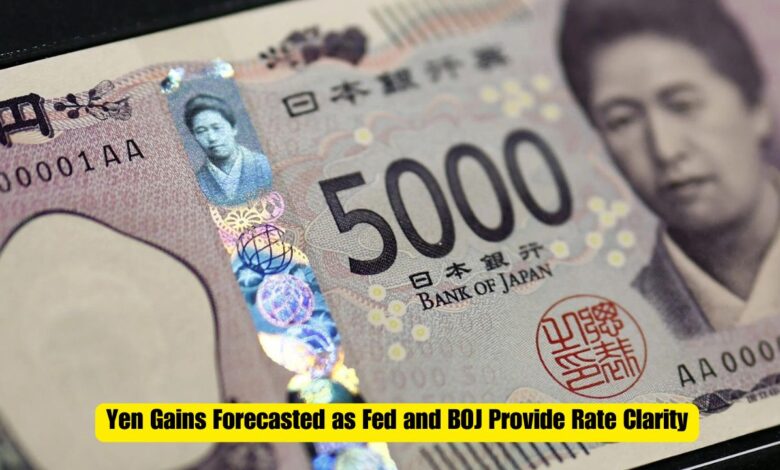Yen Gains Forecasted as Fed and BOJ Provide Rate Clarity

The Yen is expected to experience significant fluctuations as the Federal Reserve (Fed) and the Bank of Japan (BOJ) offer clearer guidance on interest rate policies. As these global economic giants reveal their plans, the Yen’s trajectory becomes increasingly crucial for investors and economists alike. This article delves into the potential movements of the Yen, analyzing the factors that could lead to its appreciation in the near future.
Understanding the Fed’s Interest Rate Policy
The Federal Reserve’s interest rate decisions have always been a major driver of global currency movements. Recently, the Fed has provided a more transparent outlook on its rate policy, signaling a potential pause in rate hikes. This pause is largely due to the cooling of inflationary pressures and the desire to avoid stifling economic growth.
For the Yen, this clarity from the Fed implies a reduced pressure on the Japanese currency. Historically, when the Fed hikes rates, it strengthens the US Dollar, often leading to a weaker Yen. Conversely, a pause or a potential cut in rates could see the Yen gaining strength as the interest rate differential between the US and Japan narrows.
BOJ’s Role in Yen Strength
The Bank of Japan has been infamous for its ultra-loose monetary policy, characterized by negative interest rates and extensive quantitative easing. However, the BOJ has recently hinted at a possible shift towards normalization, albeit at a very gradual pace.
This shift is driven by Japan’s improving economic conditions, with inflation finally approaching the BOJ’s target after years of stagnation. A more hawkish stance by the BOJ would be a significant driver for Yen appreciation. If the BOJ begins to raise rates or reduces its asset purchase program, the Yen could see a substantial uptick as investors flock to the Japanese currency, anticipating higher returns.
Global Economic Factors Influencing Yen
In addition to central bank policies, several global economic factors are poised to impact the Yen’s value. The ongoing geopolitical tensions, particularly in Europe and Asia, are leading to increased demand for safe-haven assets. The Yen has traditionally been one of the preferred safe-haven currencies, meaning that during times of global uncertainty, the Yen tends to strengthen.
Moreover, Japan’s trade balance is another crucial factor. As one of the world’s largest exporters, Japan’s economic health is closely tied to its trade performance. A robust trade surplus typically supports the Yen, as it indicates strong foreign demand for Japanese goods, leading to increased demand for the currency.
Yen Outlook Amid Fed and BOJ Decisions
Given the current landscape, the Yen is likely to experience a period of volatility as markets digest the information provided by the Fed and BOJ. If the Fed maintains its dovish stance and the BOJ moves towards tightening, we could see a scenario where the Yen gains significantly against the Dollar.
On the other hand, if the BOJ remains dovish and the Fed resumes its rate hikes, the Yen could face downward pressure. However, the consensus among analysts is leaning towards a stronger Yen in the medium term, especially if the BOJ signals any further shifts towards tightening.
Implications for Investors
For investors, the current environment presents both opportunities and risks. Those holding assets in Yen or Yen-denominated investments may benefit from the potential appreciation of the currency. However, the market’s volatility also means that timing and strategy are crucial.
Hedging strategies, such as using options or futures contracts, can be effective in mitigating the risks associated with currency fluctuations. Additionally, staying informed about central bank announcements and economic indicators is essential for making well-informed investment decisions.
Conclusion
The Yen is at a pivotal point, with its future largely dependent on the actions of the Fed and the BOJ. As both central banks provide clearer guidance on their interest rate policies, the Yen is expected to respond accordingly, potentially gaining strength in the coming months.
Investors and market participants should closely monitor these developments, as the Yen’s movements could have significant implications for global financial markets. The intricate interplay between central bank policies, global economic conditions, and investor sentiment will ultimately determine the Yen’s trajectory.




